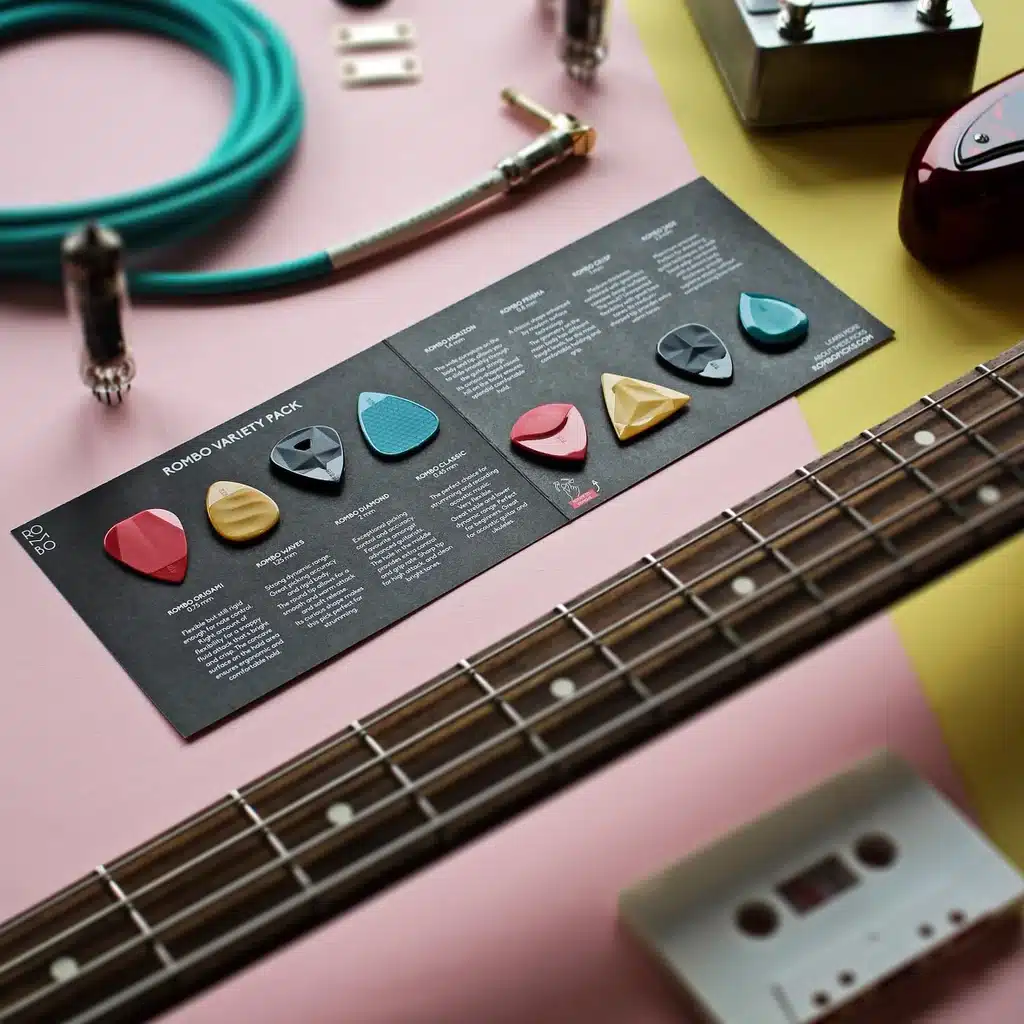Contents
Nowadays, it’s not uncommon for guitarists to use bass picks and many bassists also prefer to use guitar picks while performing. That leads to many debates about bass picks vs. guitar picks and different people have different opinions about the winner.
You have a hard time telling the picks apart? You don’t know much about the impact of the picks on the tone? You desire an in-depth analysis of the picks so you can get the right tool for the right job? Then look no further because you have found exactly what you seek.
Battle Of The Picks

Size
At a glance, bass picks and guitar picks resemble each other but if you look close enough, you should see a slight difference in size. Usually, bass picks prove thicker than their guitar counterparts:
- The average thickness of bass picks is around 0.046 inch (1.17 millimeter)
- The average thickness of guitar picks is around 0.035 inch (0.89 millimeter)
The relationship between the thickness of picks and the thickness of strings means you must take the strings into account while shopping for picks. In the case that your instrument uses thick strings, it’s a good idea to acquire bass picks. On the other hand, if your instrument uses thin strings, you should consider grabbing guitar picks. All in all, give the strings some thought and you can decide the winner in ass picks vs. guitar picks on your own.
Note: Nowadays, it’s possible to use some of the thicker guitar picks on the market to play bass in times of need. You also have the option of using bass picks that belong to the thinner side of the spectrum to play guitar if you want.
Control
For your information, the “mass” of picks influences controllability which is why bass picks tend to have an edge over guitar ones. Once pushed against the strings, especially the E and A, bass picks bend less than guitar picks. Needless to say, it’s difficult to perform if your picks bend too much every time you strike a chord. If you put control above everything else, it’s suggested that you invest in bass picks.
Tone
In general, if used in the intended role, bass picks produce a thick tone while guitar picks produce a thin tone. If you wish to mix things up, you should remember several issues: When you use bass picks to play guitar, the tone will be warm so it works well for emotional songs but not ballads. When you use guitar picks to play bass, the tone may get muted at times as you play arpeggios.
Summary
| Bass picks | Guitar picks | |
| Size | Thick on average | Thin on average |
| Control | Easy in most of the cases. | Easy on thin strings. Hard on thick strings |
| Tone | Thick | Thin |
Best Bangs For The Bucks
In the end, it’s up to you to decide the picks to use but if you need some good deals, check out these picks:
Dunlop Tortex ($5.49/pack)
Versatile and flexible, Dunlop Tortex gives a good account of itself in various settings. A combination of treated Delrin and powdered finish allows Tortex to last for quite a while too. At the moment, the Dunlop pick is available in five thicknesses: 0.6mm, 0.73mm, 0.88mm, 1mm and 1.14mm. As a result, regardless of the instrument, Dunlop is able to provide a suitable Tortex.
Pros:
High endurance
Adaptable
Cons:
Plain
Clayton Acetal ($8.39/pack)
You own a bass and you like its tone to be light? Then it’s strongly recommended that you add Clayton Acetal to your shortlist. Featuring acetal, an innovative blend of plastic, the pick of Clayton keeps the tone warm and soft. Aside from that, the size of the pick means you will feel comfortable holding on to it for an extensive period of time.
Pros:
Aesthetic
Excellent grip
Cons:
A bit pricey
Fender 351 ($9.98/pack)
Fender is a big name in the music industry so it’s only natural that its picks prove popular among the community. One example is Fender 351, a solid pick made from celluloid that is available in four thicknesses (thin, medium, heavy and extra heavy). Thanks to the groove pattern, the Fender pick minimizes the odds of slipping and that is a big plus in hot weather. If you hate to see your pick flying away in the middle of a performance, pick up Fender 351.
Pros:
Solid tone
Econmical
Cons:
Integrity can use some work
FAQs
How long do picks last on average?
Many factors affect the lifespan of picks from material to frequency of use but modern-day picks usually last a month. If you perform professionally and make use of specific techniques, your picks may wear out after a day. Thick picks that integrate resilient material take longer to wear out than other models. For good measure, you should carry around a couple of picks so if one breaks out of the blue, you can still perform.
Is there a way to stop picks from slipping?
If your picks keep slipping, it’s possible that the size is unsuitable and you should get something bigger. Additionally, you could switch to textured picks if you have trouble securing your picks.

Hi music fan! I am Jeff. Hope that you enjoy some stuff I shared here in my personal blog.
About myself, Currently I am in charging as Artist Manager/Music Supervisor at 72 Music Management. I did managed album to Grammy Award in 2017 with 7 Nominations from 2014-2020 and had the opportunities to work with : A.J. Croce, Blind Boys of Alabama, Bobby Rush, Dom Flemons, Dustbowl Revival, Sarah Grace
Governor of the Memphis Chapter of The Recording Academy is one of a award that I am lucky to achieved.
